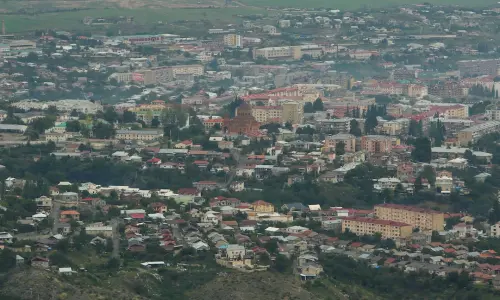TBILISI, March 13 (Reuters) – Armenia and Azerbaijan engaged in a conflict over Nagorno-Karabakh for nearly four decades following the collapse of the Soviet Union, to which they both belonged.
Nagorno-Karabakh, referred to as Artsakh by Armenians, is a mountainous region at the southern tip of the Karabakh mountain range within Azerbaijan. It is acknowledged internationally as part of Azerbaijan, however until 2023, its 100,000 residents were predominantly ethnic Armenians.
Armenians, predominantly Christian, lay claim to a longstanding presence in the area, tracing back centuries before Christ. On the other hand, Azerbaijan, with a population mainly of Turkic Muslims, also asserts deep historical connections to the region, which has been under the influence of Persians, Turks, and Russians throughout history, with conflict between the two peoples spanning over a century.
During the Soviet era, Nagorno-Karabakh was designated as an autonomous region within Azerbaijan.
Following the dissolution of the Soviet Union, the First Karabakh War (1988-1994) broke out between Armenians and Azerbaijanis, resulting in approximately 30,000 casualties and over a million displaced individuals. The conflict led to Armenians gaining control of Nagorno-Karabakh and parts of seven surrounding districts.
In 2020, Azerbaijan launched the Second Karabakh War following years of sporadic clashes, decisively overpowering Armenian defenses. The conflict lasted 44 days, with Azerbaijan reclaiming the seven districts and a portion of Nagorno-Karabakh.
The agreement entailed the deployment of 1,960 Russian peacekeepers to safeguard the vital lifeline between Nagorno-Karabakh and Armenia via the "Lachin corridor," no longer under Armenian control.
In 2022, Azerbaijani forces blocked the sole remaining road into Karabakh, resulting in severe shortages of essentials like food and fuel within the territory.
By September 2023, Azerbaijan initiated an offensive against the remnants of Karabakh, leading to a swift ceasefire and its surrender to Baku. Subsequently, almost all of the remaining 100,000 Armenians in the region fled to Armenia as refugees.
Following the mass exodus from Karabakh, both Armenia and Azerbaijan expressed intentions to sign a treaty to resolve the ongoing conflict.
Though Armenia returned some disputed territory in 2024, progress towards a comprehensive agreement was slow and sporadic, with both sides attributing blame for stalled negotiations.
Azerbaijan insisted on Armenia amending its constitution, alleging implicit territorial claims within it. While Armenia refuted such claims, it has recently indicated willingness to revise its constitution.
Additionally, Azerbaijan sought a transport corridor through Armenia connecting its main territory to Nakhchivan, an Azerbaijani enclave bordering Turkey, a key ally of Baku.
